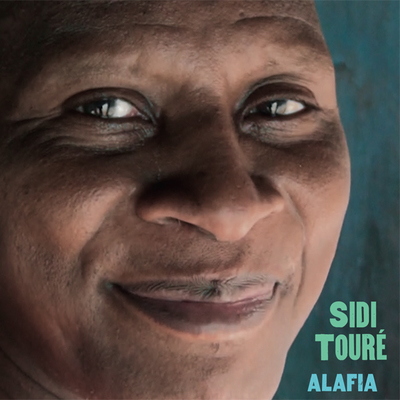
Alafia
EU/UK customers can order via our partners at Anost.net
LP version pressed on black virgin vinyl with free download card and 8 page booklet featuring photos and liner notes. CD version in a 4 panel mini-LP style gatefold package with 8 page booklet featuring photos and liner notes.
When Malian songwriter and guitarist Sidi Touré first emerged on the international scene in 2011, he was regularly compared to Ali Farka Touré, his countryman and predecessor. There was a similarity in means, sound and even surnames, and both musicians hail from the Songhaï region of Northern Mali. The signature blues-inflected guitar and plaintive vocal melisma of Songhaï folk music carries melodic and repertory characteristics that extend from Ibrahim Dicko—Touré’s mentor—to Ali Fakra Touré’s pioneering work. Over the course of two recordings—last year’s critically-lauded Koïma and his revelatory debut Sahel Folk—and attention from NPR, SPIN and Pitchfork, among others, Touré’s musical identity has fully come into its own.
On September 17, Touré returns with Alafia, his third international release for Thrill Jockey and his most focused recording to date. Touré deals with the strife and political instability plaguing his home region using the effortlessly broad musical language he’s internalized since his youth. Regional styles, including takamba, holley, and abarbarba (the butcher’s dance), along with his longtime interest in international music, form the underpinning to Touré’s lyrical ode to his country.
Recorded between two locations—Nantes, France and Bamako, Mali—during what has become the most contentious political impasse for Mali since the country’s independence decades ago, Alafia mirrors the dramatic nature of the situation. Mali is a massive, culturally diverse and largely peaceful nation that is still struggling to maintain order following a Tuareg rebellion in Touré’s home region in the North last April. The ensuing chaos that followed led to a coup in the capital, leaving a power vacuum in which Islamic extremists have cast a dark and violent shadow over Northern Mali.
While Touré’s Gao was under control of Islamic groups, the band recorded in Nantes on the heels of Touré’s first European tour. Recording in Bamako took place after the “Sahara Soul” tour with well-known Malian acts Bassekou Kouyate and Tamikrest, while Northern Mali’s biggest cities had been liberated. Alafia is marked by these contrasting contexts and the varied mind-frames they imply. The album’s title, which means “peace,” is a simple word that sums up an album of thematic complexities—joy, dialogue, reconciliation, multiculturalism, respect and the fight for a better society— and in-depth explorations of the Songhaï folk music from Touré’s beloved home region.
The winner of two Malian national awards for best singer, Touré led Gao’s regional orchestra, The Songhaï Stars, and, in 2011, he released Sahel Folk, his debut album for Thrill Jockey and toured North America for the first time. This tour took him to prestigious venues and festivals, including New York’s Lincoln Center, Chicago’s Old Town School of Folk Music and the Chicago World Music Festival. Through Thrill Jockey’s introduction of Touré to new audiences, he is beginning to achieve success and critical acclaim abroad.
Backed by this band of young talented musicians, who have joined him on severals tours, he invited friends from the North to participate to this album: the singer Leïla Gobbi, the kolo player Berté Ibrahim, and the rising star guitarist (and Touré disciple) Baba Salah. Touré also opens his music to Malian traditions outside the Songhaï realm with the n'goni virtuoso Abdoulaye Koné aka Kandiafa and the legendary Fula flute player Cheick Diallo.
Touré and will tour the U.S. this fall with twice-Grammy-nominated Cedric Watson under the banner of the International Blues Express. He will return for his own headlining tour in Spring 2014.